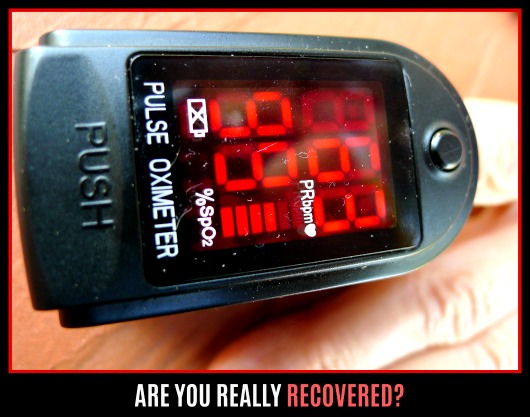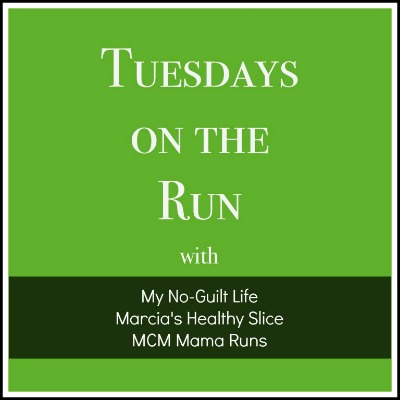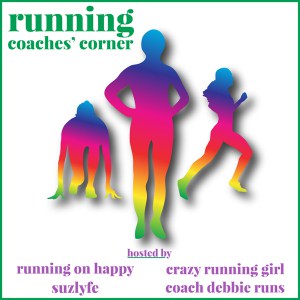
I’ll sleep when I’m dead. How often do you hear people say that? Yet we get stronger when we rest and recover properly. But how do you know if you’re recovered?
Meet my little friend
The pulse oximeter. That’s right, like the thing you wear on your finger when you’re in the hospital. It measures your pulse and your oxygen levels. It’s inexpensive, small, and easy to use.
So why would you need one? I don’t have a GPS watch with a heart monitor. I don’t want to wear a chest strap. But I did want to start tracking my resting heart rate (RHR). And the pulse oximeter has really helped me do just that!
It doesn’t wake up Mr. Judy (although I do make sure to cover it up with the blanket). It doesn’t require an app or a phone. I know most people sleep with their phones, but I don’t. It’s the perfect solution for me.
You, of course, can do the same thing with your watch if it has a HR Monitor. Or if you don’t have to worry about waking someone up, you can just take your pulse. The tricky thing about resting heart rate is you need to take it before you get out of bed first thing in the morning. Although sometimes I have to make a pitstop in the middle of the night; I don’t take it then, but I will take it a few hours later right before I get up.
So are you recovered?
Bear in mind I am not a medical professional. If your heart rate is very elevated after a hard workout (I’ve seen 7 beats per minute or 10% used as a benchmark for very elevated), chances are you are not recovered.
That doesn’t mean you need to take a rest day, but it would be wise to take it a little easier.
If you find that over time your RHR seems to be rising, that may also be a sign that you’re overtraining. Supposedly the opposite is true too: if over time your RHR declines, it’s a sign that you’re getting fitter. I’ve only been tracking mine for a few months, but definitely haven’t seen any declines.
However, of course after I wrote the paragraph above, I saw my lowest RHR to date. Hopefully that means I’m getting a little fitter.
I have shuffled around workouts occasionally when my RHR has been more elevated than usual. I haven’t been tracking long enough to know if it’s made a difference. It certainly hasn’t hurt.
There is no one way to tell if you’re recovered
Recovery and overtraining are tricky buggers. Sometimes you think you’re doing everything right, and yet you succumb to an illness at the worst times. Is it lack of recovery? Is it bad luck? I don’t think there’s any definitive way to tell.
I can tell you that I like having this simple tool in my toolbox.
What signs make you think you’re overtrainng?
Have you ever tracked your RHR?
See this article here for more information on RHR & Recovery
I’m linking up with with MCM Mama Runs, Marcia’s Healthy Slice, and My No Guilt Life for the Tuesdays on the Run linkup.

This week I am also joining up with Running on Happy, Suzlyfe, Crazy Running Girl, and Coach Debbie Runs each week for the Coaches’ Corner linkup


I have an app that measures this, and the variation in the gaps between the HR. It also asks you if you slept well, have muscle fatigue etc so I expect that it these are important signs of recovery too
LikeLiked by 1 person
It was fascinating watching my oxygen levels rise & fall with the elevation.
LikeLike
Wow, Judy. You are the queen of gadgets.
My watch measures my heart rate. I’ve glanced at it but have not really paid attention.
I think stress is a much better influencer (if that a word?) than overtraining.
I don’t overtrain since I am usually able to run the day after a half marathon. I don’t get aches and pains (knock on wood.) But when I am dragging and running very slow, I know it’s time to rest for a few days. Many times like this week, it’s not from running, it’s from work stress.
LikeLiked by 1 person
Overtraining is a combination of many things, not just running. The pulse oximeter was way cheaper than a new watch! It’s just one metric.
Sometimes I don’t feel that tired but my RHR is way up & I know it’s time for some extra rest.
I’m sure someday I’ll get a watch that shows HR. It was cool to see my oxygenation rise & fall with the elevation!
LikeLike
And what did those elites do before we had all these gadgets? I sometimes think we over think running and we have too much technology.
LikeLiked by 1 person
They’re more like guidelines. 😊 Technology can be used for great good or great evil. And there have always been coaches with stopwatches!
LikeLike
What a nice little gadget. I’ve definitely measured resting pulse in the past. Anything that helps us pay attention to our bodies is a good thing in my opinion.
LikeLiked by 1 person
Someday I’m sure I’ll have a Garmin that measures HR, but for now this is working for me & it’s a really good option for those of us who don’t have a HRM!
LikeLike
I’ve never measured my resting heart rate! I don’t have that capability with my watch and I wonder if I would want to get that feature when I eventually upgrade…it must be so helpful to continue to learn how your body works and when you may be going the wrong path and overtraining.
LikeLiked by 1 person
I really do think RHR is good info to have (and my watch doesn’t measure it either). Sometimes you don’t really feel that tired, but that RHR shows you you are!
Of course it’s not the only way to tell, but it’s definitely useful. I didn’t take it on race morning, as we had to get up so dang early & basically I wouldn’t have changed anything — I did for my previous race, and it was quite elevated — excitement, no doubt!
LikeLike
I have never tracked my RHR but this little tool looks pretty nifty!
LikeLiked by 1 person
I am actually finding tracking my RHR to be very valuable. But of course you don’t need this if you have a watch that’s a HRM — I don’t, right now; someday I’m sure I will.
LikeLike
That gadget is pretty neat! I have never measured my resting heart rate but that’s definitely something I need to do!
LikeLiked by 1 person
Well, I don’t know about “need”, but I definitely find it a useful tool.
LikeLike